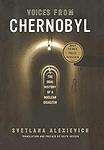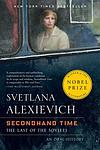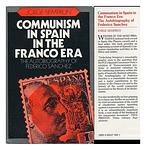The Greatest Belarusian, Spanish "Nonfiction" Books Since 1980
Click to learn how this list is calculated.
This list represents a comprehensive and trusted collection of the greatest books. Developed through a specialized algorithm, it brings together 300 'best of' book lists to form a definitive guide to the world's most acclaimed books. For those interested in how these books are chosen, additional details can be found on the rankings page.
Genres
Countries
Date Range
Reading Statistics
Click the button below to see how many of these books you've read!
Download
If you're interested in downloading this list as a CSV file for use in a spreadsheet application, you can easily do so by clicking the button below. Please note that to ensure a manageable file size and faster download, the CSV will include details for only the first 500 books.
Download-
1. Voices from Chernobyl by Svetlana Alexievich
This book is a haunting collection of personal accounts about the nuclear disaster at Chernobyl in 1986. The author has meticulously gathered and woven together interviews from survivors, including former workers of the plant, residents, and soldiers. Each narrative reveals the physical and psychological impact of the disaster on individual lives, creating a deeply moving oral history of an event that has had profound consequences on the people of Belarus and Ukraine.
-
2. Out Of The Fire by Ales Adamovich, Yanka Bryl, Vladimir Kolesnik
"Out Of The Fire" is a powerful collection of stories that vividly depict the horrors and resilience of the human spirit during World War II. Through the eyes of various characters, the book explores the devastating impact of war on individuals and communities, capturing their struggles, sacrifices, and moments of hope amidst the chaos. With hauntingly beautiful prose, the authors bring to life the unimaginable atrocities of the war, reminding us of the importance of remembrance and the enduring strength of the human soul.
-
3. My Last Sigh by Luis Buñuel
"My Last Sigh" is an autobiography that offers a candid and vivid account of the life and career of one of cinema's most groundbreaking and influential directors. The book delves into his early years in Spain, his deep friendships with prominent artists and intellectuals, and his experiences in the surrealist movement. It also explores his creative process, the making of his major films, and his philosophical and personal reflections. Rich with anecdotes and insights, the memoir provides a unique window into the artistic, social, and political climates of his times, revealing the complex and often contradictory nature of a fiercely original filmmaker.
-
4. Secondhand Time: The Last of the Soviets by Svetlana Alexievich
"Secondhand Time: The Last of the Soviets" is a compilation of personal narratives from individuals who lived through the transformation of the Soviet Union to modern Russia. The book provides a vivid and emotional portrayal of the experiences of ordinary people during this period of significant societal and political change. The author uses these narratives to explore themes such as the impact of political ideology on individual lives, the nature of memory and history, and the enduring effects of trauma and loss.
-
5. Space In Motion by Juan Goytisolo
"Space in Motion" is a reflective exploration of the concept of space as it relates to human experience, culture, and history. The book delves into the ways in which space is perceived, constructed, and navigated, offering a philosophical and literary examination of the subject. The author weaves together a tapestry of ideas, drawing from various disciplines and perspectives, to challenge the reader's understanding of space beyond its physical dimensions, considering its impact on identity, memory, and our place in the world. Through a blend of narrative and critical thought, the work invites contemplation on the fluidity and dynamism of space in our lives.
-
6. Communism In Spain In The Franco Era by Jorge Semprún
This book provides an in-depth analysis of the communist movement within Spain during the rule of Francisco Franco, a period marked by authoritarianism and political repression. It delves into the complexities and challenges faced by communists who operated underground, striving to resist and eventually overthrow Franco's regime. Through a blend of historical documentation and personal narratives, the work sheds light on the ideological struggles, internal conflicts, and the broader impact of communism in Spain's fight for democracy and social justice. The narrative not only explores the political landscape of the era but also examines the human aspect of resistance, highlighting the resilience and sacrifices of those who fought against tyranny.
-
7. The Nature Of Nature by Enric Sala
This book explores the intricate and essential relationship between humanity and the natural world. The author, a renowned marine ecologist, delves into how nature operates, emphasizing the importance of preserving biodiversity for the planet's health and our own survival. Through a combination of scientific insights and personal experiences, the narrative makes a compelling case for the urgent need to protect and restore the Earth's ecosystems. The author argues that by understanding and respecting the fundamental principles of nature, we can solve many of the environmental challenges facing us today, ultimately leading to a more sustainable and prosperous future for all living beings.
Reading Statistics
Click the button below to see how many of these books you've read!
Download
If you're interested in downloading this list as a CSV file for use in a spreadsheet application, you can easily do so by clicking the button below. Please note that to ensure a manageable file size and faster download, the CSV will include details for only the first 500 books.
Download





